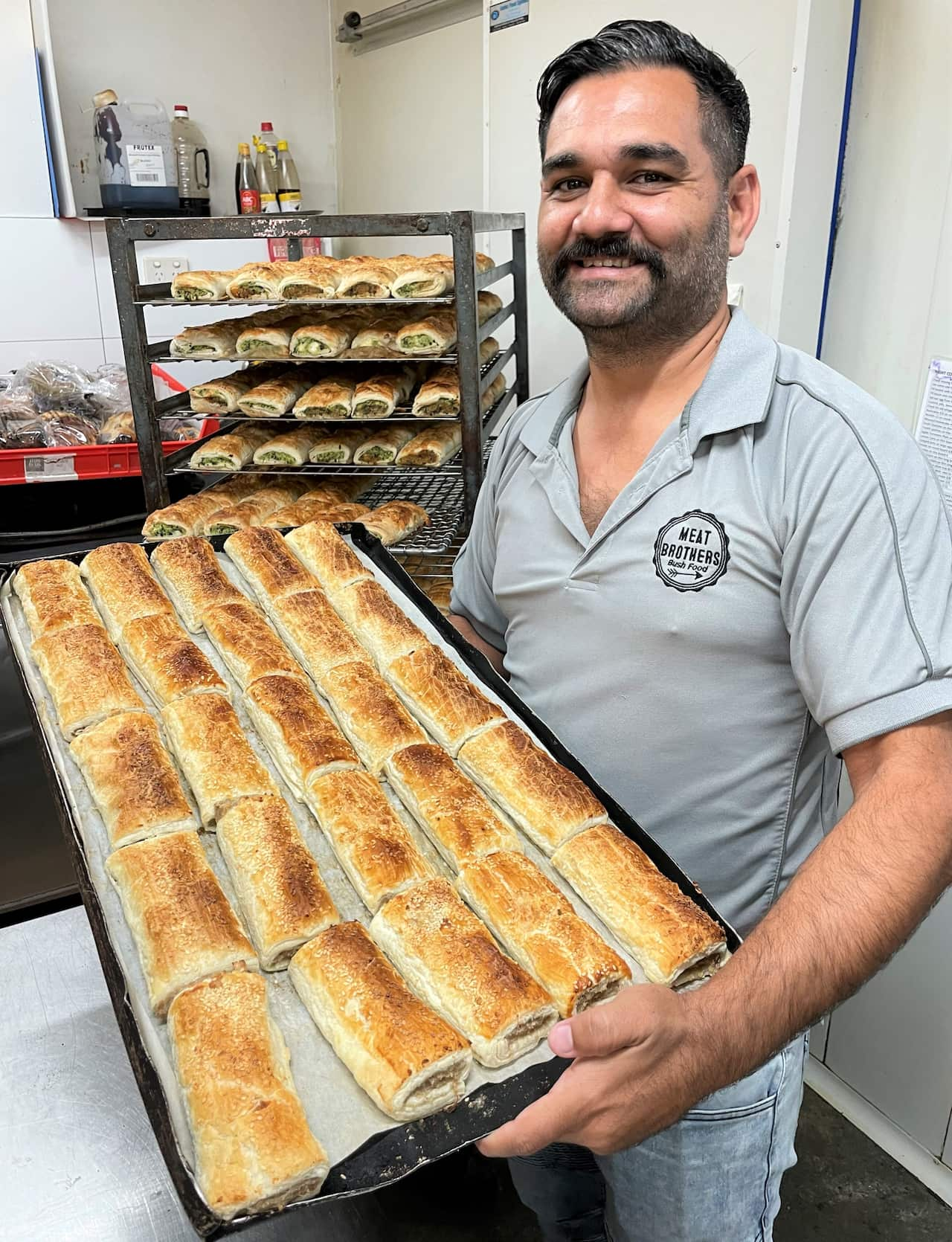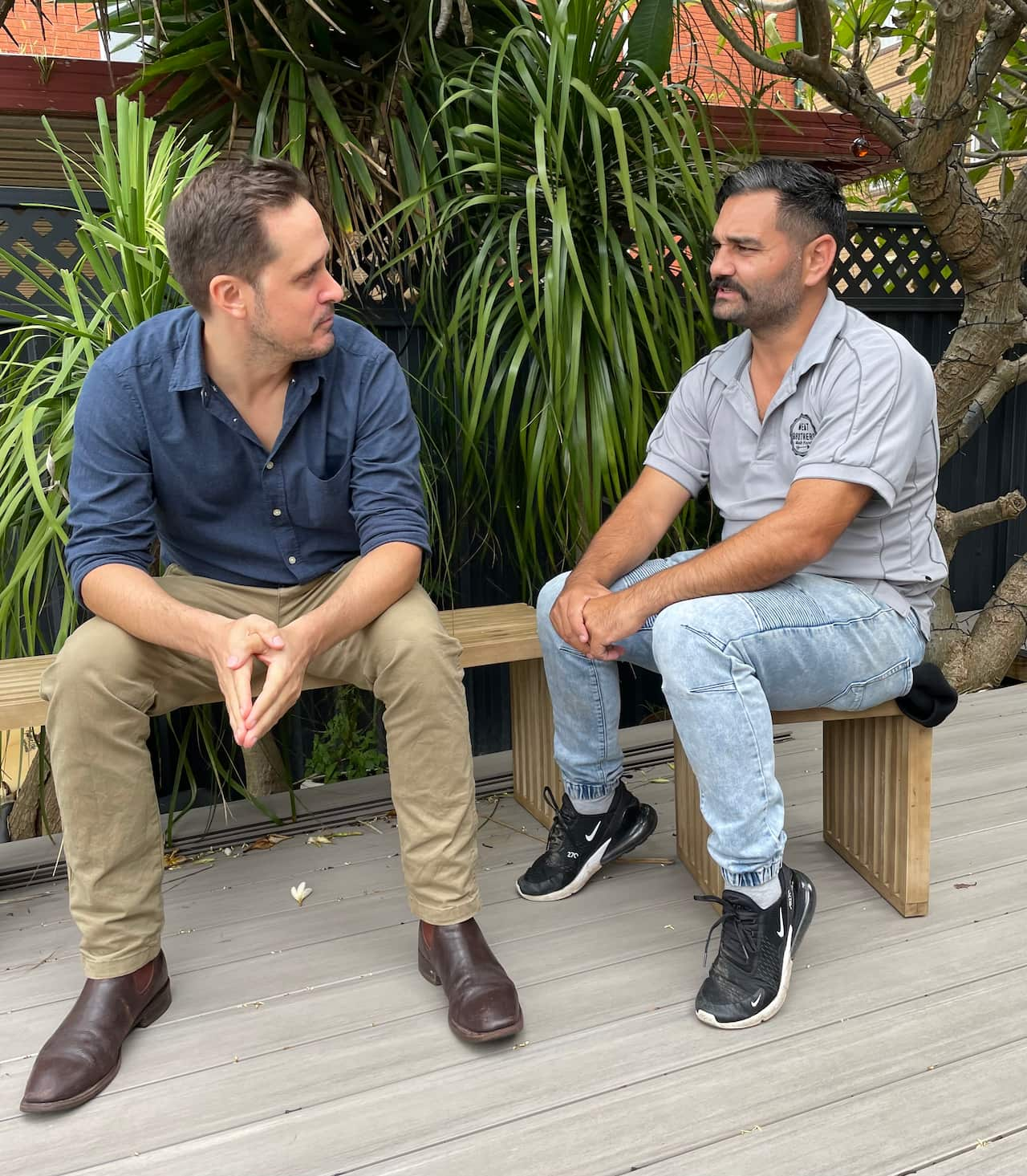Corey Grech is a Kamilaroi man who grew up in Sydney’s Newtown and has spent his career in commercial kitchens, introducing bush food flavours to the broader community.
Through his business, Meat Brothers, he has recently turned his culinary skills towards helping those in need: Indigenous communities in flood-affected northern NSW.
"They are badly affected up there, like nothing I've ever had to deal with in my life," Corey, 40, tells SBS News.
"So this is a small sacrifice and a few heavy days' worth of work. But it’s nothing compared with what they're going through.
This week, Corey was busy loading food into a small white van for the long trip north, carrying 1,500 sausage rolls plus pies and drinks to Lismore.

Corey Grech with lemon myrtle and chicken rolls. Credit: SBS News/ Sandra Fulloon
This week, the Prime Minister said a national emergency would be declared for flood-affected areas in northern NSW and South East Queensland, with the damage bill estimated at more than $3.5 billion.
Indigenous residents from the small community of Cabbage Tree Island, near Lismore in northern NSW, are among the worst affected.
"It's heartbreaking," Cabbage Tree Island resident Quaneena Waters told NITV this week.
"This was my grandfather's house and it was passed down to me. In 22 years I have never seen anything like this."
Some of the island's 180 residents have begun the slow process of clearing up what is left of their homes and possessions.
"We came in this [week] to check out the houses," Alwyn Roberts says.
"It's devastating to see what has happened here.
"But as a community, we will get through this and rebuild and do it together."
Many houses on Cabbage Tree Island will need to be replaced due to damaged infrastructure, according to engineering surveys.
"Most of the housing structures are deemed unsafe," says Chris Binge, CEO of the Jali Aboriginal Land Council. "And we have already lost our community centre, our school, our farm sheds."
At Lismore, Corey will join an army of volunteers, supplying and delivering food and medicine to locals impacted by flooding.
Corey developed bush food recipes for the meals which were prepared at a commercial bakery, The House of Pie, in Sydney’s Matraville.
"We have chicken and lemon myrtle sausage rolls. We also make kangaroo chili pies, chicken and lemon myrtle pies," Corey says looking at racks of freshly made pastries.
"The lemon myrtle in the pastry is a bit citrusy. It is made from lemon rind, not lemon juice, so it's not bitter."

Corey is delivering 1,500 sausage rolls this weekend. Credit: SBS News / Sandra Fulloon
"It is catastrophic around Lismore, and looks like an inland tsunami hit," says Native Foodways co-founder Lachlan McDaniel, 36.
"It is difficult to wrap your head around just how damaging this is to a community and how much effort is needed to clean up."
Through its Sydney business contacts, Native Foodways has raised thousands of dollars to finance Corey's food delivery.

Lachlan McDaniel serves sausage rolls and coffee to locals in Lismore on Saturday. Source: Supplied
Lachlan belongs to the Kilari clan of the Wiradjuri Nation and is currently completing a PhD at the University of Technology Sydney in Wiradjuri cultural revitalisation.
His Native Foodways business is working to return more revenue from Australia's native food industry to Indigenous people.
"It is worth well over $1 billion annually," he says.
"Yet only one per cent of the profits actually go to Indigenous people, which we think is problematic.
"So our goal is to make sure that Indigenous growers and communities get a fair share of that revenue."

Native Foodways supports Indigenous bush food growers Credit: Supplied: Native Foodways
"We've found some amazing non-Indigenous land-owners and they've been generous enough to allow us to use that land to grow food, to put into native food products," Lachlan says.
He says much of the bush food sold in Australia is grown offshore.
"Many lemon myrtle leaves are harvested from trees grown in China and Malaysia, with no obvious connection to Indigenous communities at all," he says.
"And I have recently learned that finger limes are being grown in Arizona, USA. So, we've got decades' worth of catching up to do."

Lachlan McDaniel (left) and Corey Grech own Indigenous businesses. Credit: SBS News / Sandra Fulloon
By joining forces, they are able to deliver more food to those most vulnerable.
"There's a devastated community (on Cabbage Tree Island) of around about 100 houses, and around 400 people with no electricity, and no access to food," Corey says.
"So we plan on creating little packs of 10 sausage rolls and 10 coffees, to feed as many people as we can."










